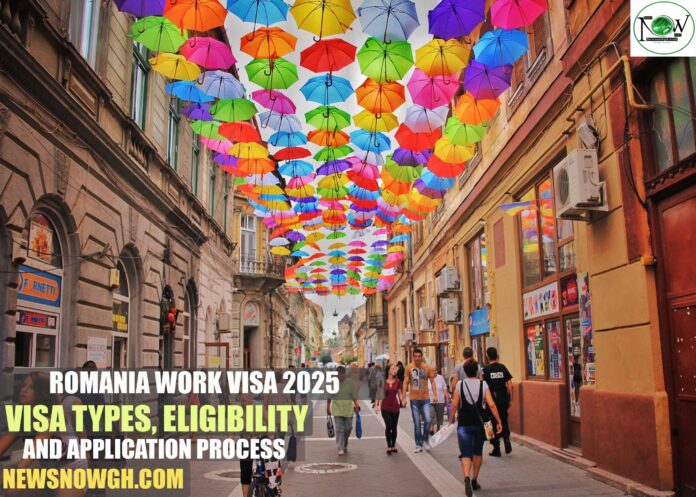Romania Work Visa 2025: Visa Types, Eligibility, and Application Process
Embarking on a career in Romania offers exciting opportunities for foreign workers. As a rapidly developing country within the European Union, Romania boasts a high standard of living and a wealth of prospects for skilled professionals, entrepreneurs, and seasonal workers. If you’re considering working in Romania in 2025, understanding the work visa process is essential.
This guide will navigate you through the types of work visas, eligibility requirements, the application process, and frequently asked questions.
Romania Work Visa Overview
The Romanian work visa allows non-EU and non-EEA citizens to live and work legally in the country. Citizens from EU and EEA nations have the freedom to work in Romania without needing a visa. However, if you are from outside these regions, you must secure a work visa.
Typically, this visa is granted once your Romanian employer obtains a work authorization for you. After approval, you can apply for a long-stay work visa, known as the D/AM visa.
Types of Romanian Work Visas
Romania offers various work visas based on employment types. Understanding these categories is crucial, as each has specific requirements and application procedures.
- Standard Work Visa: This is the most common visa, issued to foreigners employed by Romanian companies. It requires a work permit and is based on long-term employment contracts.
- Seasonal Work Visa: This visa is for migrant workers taking temporary roles in sectors like agriculture, tourism, or construction. It is usually valid for up to six months.
- Intra-company Transfer Visa: If you are transferring within a multinational company to a Romanian branch, this visa is necessary.
- Skilled Worker Visa: High-skilled professionals can apply for this visa, including the EU Blue Card for those with specialized training and qualifications. This visa can lead to permanent residency.
- Cross-Border Worker Visa: Designed for individuals living near Romania’s borders who regularly commute to work.
- Training/Internship Visa: This visa is for those seeking professional training or internships with Romanian companies.
Eligibility Criteria
To qualify for a Romanian work visa in 2025, several conditions must be met. These criteria ensure that only qualified applicants can work in Romania:
- You must have a valid job offer from a Romanian employer.
- Your employer must secure a work permit fromthe Romanian authorities before you apply.
- A clean criminal record is essential.
- Relevant skills or work experience related to the job are required.
- The employer must prove that no EU or Romanian citizens can fill the position.
- A medical examination may be necessary to confirm your health status.
Application Process
The application process for a Romanian work visa involves several steps:
- Job Offer: Begin by securing employment with a Romanian employer. An official job offer is required to proceed.
- Work Permit Application: Your employer will apply for a work permit on your behalf at the General Inspectorate for Immigration in Romania.
- Receive Work Permit: Once approved, your employer will receive the work permit, a crucial document for your visa.
- Apply for Long-Stay Work Visa: With the work permit, apply for the D/AM visa at the Romanian embassy or consulate in your home country. Complete the application form, attach the required documents, and pay the visa fee.
- Visa Interview: You may need to attend an interview regarding your job, employer, and intentions in Romania.
- Receive Visa: If your application is approved, you will receive your long-stay work visa, typically valid for 90 days.
- Travel to Romania: With your visa, you can move to Romania and start working.
- Residence Permit Application: Within three months of arrival, apply for a residence permit at the local Immigration Office. This permit allows you to live and work in Romania beyond your initial visa validity.
Validity and Renewal
A Romanian work visa typically lasts 90 days but can lead to a longer-term residence permit, usually valid for one year. This permit can be renewed annually based on your employment contract. After several years of working in Romania, you may become eligible for permanent residency or even Romanian citizenship.
Processing Time
Processing times for work visas can vary depending on the workload of Romanian authorities and your local embassy. Generally, the work permit application can take about 30 days, while the embassy visa processing may take between 10 to 20 working days. It’s advisable to start the process several months before your expected start date.
Conclusion
Navigating the Romanian work visa process in 2025 is straightforward if you follow each step carefully. The journey begins with a job offer and progresses through the work permit application to obtaining your visa. Upon arrival, securing a residence permit will ensure your ability to work legally in Romania for an extended period.
Despite potential challenges like language barriers and processing delays, Romania remains a sought-after destination for foreign workers seeking new opportunities in Europe. With the right preparation and knowledge, you can successfully embark on your career in Romania.
Follow NewsNowGh to stay updated on the latest information regarding work permits, visas, and visa-sponsored employment.


